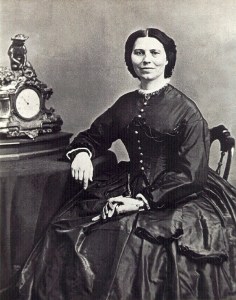Do you know that game where people ask each other which famous person they would most like to have dinner with? Well, for me it’s Clara Barton. I would jump right to the punch line: Dearest Clara, how DID you do it?
How did you stand up for enslaved people during the height of the Civil War? How did you manage to care for the men fighting in the Civil War with all the gore that war brings, in your hoop skirt no less?
Men and women alike were frowning upon your activities and actively blocking your efforts—and asking you to simply go home and be a lady. How were you able to help families find their missing husbands, sons, and fathers during and after the war, and then help locate and mark nearly 13,000 graves?
Founding the American Red Cross
And here’s the big one, Clara: How were you able to take the lessons you learned from caring for soldiers during the war and assisting in disasters to build one of the greatest humanitarian organizations of all time, the American Red Cross—as a 59-year-old single woman, no less? Most people told you it was impossible to create an organization that was impartial, neutral, independent of the government, and run by volunteers. Then you led the organization for 23 years. They thought you were crazy, but you never gave up.
You inspire me never to give up!
Since I can’t spend dinner or, even better, a weekend with Clara, I’m doing the next best thing—preparing to lead a tour encapsulating her life. It’s a trip I intended to lead eight years ago.
A personal tragedy and a missed opportunity to study Clara’s legacy.
In 2016, my husband Bob and I planned a tour exploring the life and legacy of Clara Barton. As a 40-year Red Cross volunteer (now 48 years!), I was captivated, as I still am, by the extraordinary woman who started and led the organization later in life and during a time period when women could not vote. I wanted to learn how Clara forged a bold path of service to help those in need as well as how the Red Cross continues its mission to prevent and relieve suffering, here at home and around the world. I also wanted to learn more about the amazing volunteer opportunities available.
The day before our trip, Bob was in a devastating bicycle accident. (He wrote a memorable post about his own history with the Red Cross shortly before his accident.) I spent the next 10 days at his side in the hospital before he died. Meanwhile, the trip commenced without us. It was just not meant to be. Instead, I learned many other lessons about loss and grieving and resilience—in addition to what it’s like to spend 10 brutal, intense days in the middle of a health care system that does not always work. (The time I spent in the hospital and the year following Bob’s death changed me forever. I have written about that time—as a nurse, wife, and mother—in a book called Resetting: An Unplanned Journey of Life, Loss, and Loving Again.)
Another chance.
Now, eight years later—and newly remarried—I continue to be very active in the American Red Cross at the regional and national levels. I became an executive leadership coach in 2022 after retiring from the Robert Wood Johnson Foundation. Yes, I started my own business in my later years (with my current husband), and Clara was standing right there beside me.
I spend most days now working with clients to unleash their full potential and increase their impact. But I still want to know how one woman—who had already surpassed the life expectancy for women at that time—”leveraged” her intense devotion to helping others to start an organization that would change the world forever.
As a result, I am excited to lead this one-week, Washington D.C.–based tour again. In the coming week, we will visit the sites that helped influence Clara’s vision of an American Red Cross, including the Pry House Field Hospital Museum, the Antietam Battlefield, the Library of Congress, Office of Missing Soldiers, and the American Red Cross National Headquarters. And each one of us will write a blog post about our experiences.
As I get ready to embark on this tour, I am reflecting on how Clara unleashed her own potential to maximize her impact—and how her story is relevant for the nursing profession today.
Join me on my journey virtually, won’t you? New posts will be published daily for the next week.
By Susan B. Hassmiller, PhD, RN, FAAN, principal, SuLu Coaching & Consulting
The post How Did She Do It? A Second Chance to Study Clara Barton’s Legacy appeared first on Off the Charts.



